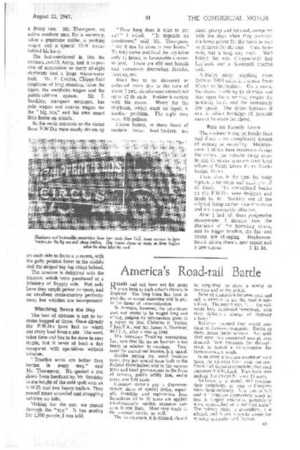America's Road-rail Battle
Page 37

If you've noticed an error in this article please click here to report it so we can fix it.
ROAD and rail have not for many years been at each other's throats in England. The long truce has been in part due to sound reasoning and in part to the threat of nationalization.
In America, however, the inter-transport war seems to be waged long and strong, judging by information given in a report by Mrs. Christine R. Taylor, F.Inst.T A., and Mr. James A. Dunnage, M.I.T.A., after a visit in 1946.
The American Trucking Association. Inc., says that the tax on hauliers is too heavy in relation to earnings. Total taxes far exceed net income, it is stated.
Besides paying the usual business taxes, they pay special taxes both to the Federal Government and to the various State and local governments in the form of licences, public utility fees, excise taxes, and fuel taxes.
Commai carriers pay a disproportionate share of special levies, especially franchise and registration fees. Sometimes 20 to 30 taxes are applied simultaneously against common carriers in one State. Most may apply to the contract carrier as well.
The tax structure, it is claimed, should
be simplified, to show a saving to hauliers and to the public.
Bone of contention between road and rail is whether or not the road is subsidized. The report says: ". . . the railroads have continued relentlessly with their fallacious charge of highway subsidy.
Railways assumed they would continue to dominate transport. Roads, to them, meant feeder services. Not until 1910 were they concerned enough over demands from motorists for throughroads to launch a counter-drive for farm-to-market roads.
In an attempt to cause exorbitant road taxes the railways have made the continual and tiresome complaint that road transport is subsidized. They have been making that charge for over 15 years.
Railways, it is stated, will continue their complaints so long as Congress takes them seriously. It is time to halt such a "senseless controversy which at best is largely academic, particularly when approached on a national scale." The railway claim is groundless, it is alleged, and is just a smoke screen for winning sympathy and favours.
















































































